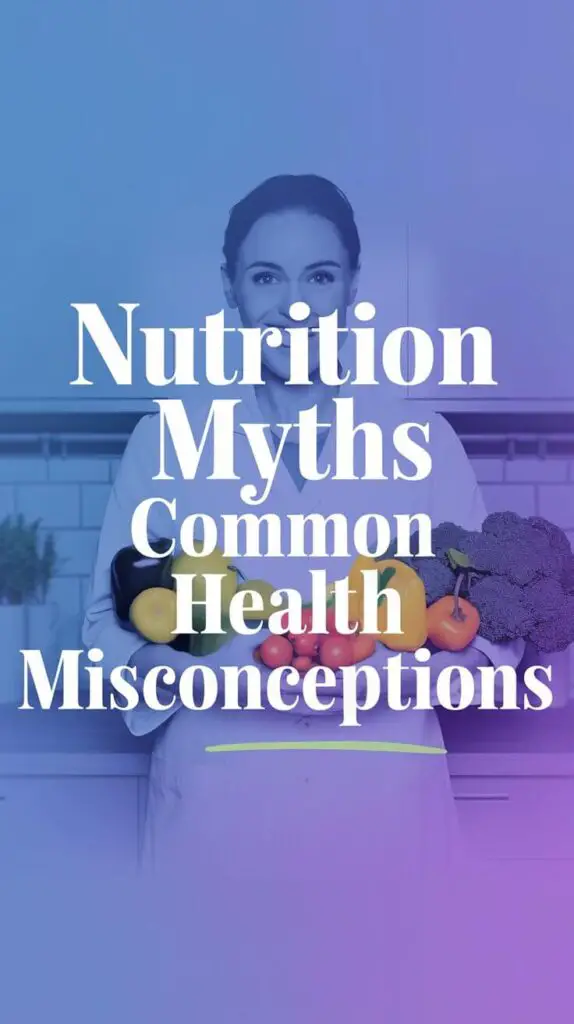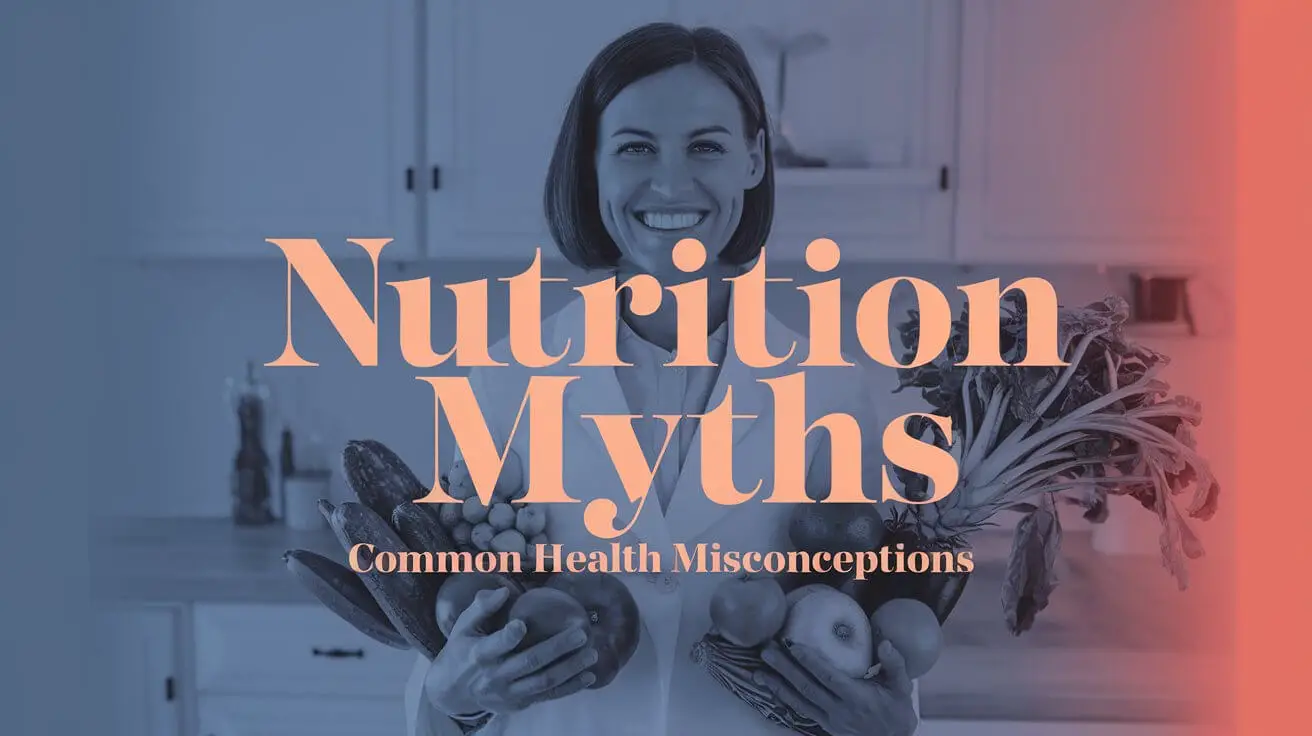Nutrition is an essential part of our daily lives. It’s the fuel that powers our bodies, yet, over time, numerous myths and misconceptions have spread about food and health. Many of us, myself included, have fallen for some of these myths at one point or another. From dieting to fitness, there’s so much information out there that it’s easy to get confused. I’ve certainly had my moments of doubt, but after doing more research and learning from personal experience, I realized how many of these nutrition myths simply aren’t true.
In this article, let’s take a look at some of the most common nutrition myths and the real truth behind them. It’s time to clear up the confusion and get back to the basics of eating healthy.

Myth 1: Carbs Are the Enemy
I remember when I first started getting serious about my health journey, I kept hearing that carbs were bad for you. I tried cutting them out completely, believing that they were the main cause of weight gain. However, after learning more, I realized that carbs are an important energy source for our bodies. Our brain and muscles rely on them for fuel, especially if you’re active.
The key here is choosing the right kind of carbs. Whole grains, fruits, and vegetables are great sources of healthy carbohydrates. Processed carbs, like sugary snacks or white bread, should be limited, but there’s no need to fear healthy carbs. They’re an essential part of a balanced diet.
Myth 2: You Need to Drink 8 Glasses of Water a Day
I used to feel guilty if I didn’t drink exactly eight glasses of water a day. But the truth is, the amount of water you need depends on many factors such as your body size, activity level, and the climate you live in. Some people may need more, while others might need less. Additionally, foods like fruits, vegetables, and soups also contribute to hydration, so it’s not all about drinking water alone.
Listening to your body is the best approach. Thirst is a natural signal that you need more fluids. If you’re active or the weather is hot, you may need to drink more, but if you’re not feeling thirsty and you’re eating plenty of hydrating foods, you might not need those eight glasses.
Myth 3: Eating Late at Night Leads to Weight Gain
This is another myth I used to worry about. I thought that if I ate anything after 7 PM, I’d automatically gain weight. But, through personal experience and research, I’ve come to learn that what really matters is your overall daily calorie intake, not the time of day you eat. If you’re eating balanced meals throughout the day and staying within your caloric needs, eating late won’t lead to weight gain.
It’s important, however, to choose healthy snacks if you’re eating later in the day. A small portion of fruit, nuts, or yogurt can be a great option that doesn’t sabotage your health goals.
Myth 4: All Fats Are Bad
For a long time, I was afraid of eating any fats because I thought they would make me gain weight. But not all fats are created equal. There are healthy fats that are crucial for your body’s functions, such as omega-3 fatty acids found in fish, flaxseeds, and walnuts. These healthy fats help with brain function, heart health, and reducing inflammation.
On the other hand, trans fats and excessive saturated fats found in processed foods should be avoided. It’s all about balance—incorporating healthy fats into your diet in moderation can improve overall health.
Myth 5: Eating More Protein Will Help You Lose Weight
While protein is an essential part of a balanced diet, I’ve learned that simply increasing your protein intake doesn’t automatically lead to weight loss. This was something I experimented with for a while, thinking that the more protein I ate, the faster I would shed pounds. In reality, weight loss is about creating a healthy, balanced diet with a combination of protein, carbs, and healthy fats.
Protein helps to build muscle, but if you’re consuming too much, especially in place of other nutrients, it can lead to an imbalance in your diet. Moderation is key. Eating a variety of foods ensures that you get all the nutrients your body needs.
Myth 6: Healthy Foods Are Always Expensive
When I first started eating healthier, I thought it would be impossible to maintain a balanced diet without spending a fortune. But I’ve come to realize that eating healthy doesn’t have to break the bank. You don’t need to buy expensive superfoods or organic products to eat well.
Frozen vegetables and fruits, beans, lentils, oats, and whole grains are affordable options that are just as nutritious as fresh alternatives. Planning your meals in advance, buying in bulk, and choosing seasonal produce can help reduce the cost of healthy eating. Eating well on a budget is possible with some smart choices.
Myth 7: Juicing Is a Great Way to Detox
For a while, I was tempted by the idea of juice cleanses to “detox” my body. Many ads and influencers claim that juicing can cleanse the body and promote weight loss. However, I’ve found that your body already has its own detox system—the liver and kidneys. Rather than relying on expensive juices, I’ve learned that eating a balanced diet full of whole foods, fiber, and plenty of water is the best way to support your body’s natural detox process.
Juicing can be part of a healthy diet when done in moderation, but it’s not a miracle solution for weight loss or detoxing.
Myth 8: All Calories Are the Same
Not all calories are created equal, and this is something I’ve experienced firsthand. A 100-calorie pack of cookies is very different from 100 calories of vegetables or lean protein. While both may provide the same amount of energy, the nutrient content differs greatly. Whole foods like fruits, vegetables, and lean meats provide vitamins, minerals, and fiber, which help support overall health.
On the other hand, empty-calorie foods like sugary snacks or fast food may provide energy but lack essential nutrients. It’s important to focus on nutrient-dense foods that give your body the fuel it truly needs.
Conclusion
Nutrition can feel like a complex topic with so many myths and misconceptions out there, but the truth is, there’s no one-size-fits-all solution. I’ve learned a lot over the years, from trying out different diets to figuring out what truly works for my body. The key is to focus on balance, moderation, and whole, nutrient-dense foods.
Don’t let the myths hold you back from making healthier choices. Instead of following trends, listen to your body, do your research, and make informed decisions about your health. You don’t need to buy into every diet fad or food trend—simple, wholesome nutrition can be both achievable and sustainable.
